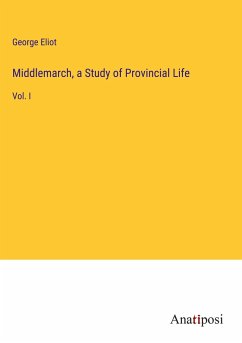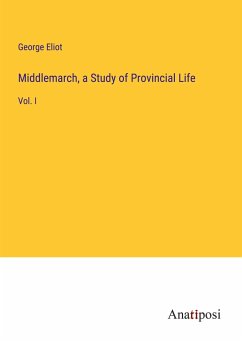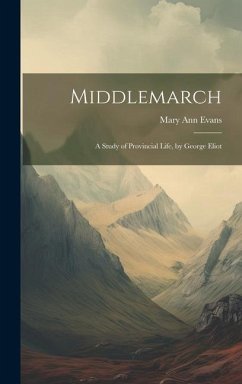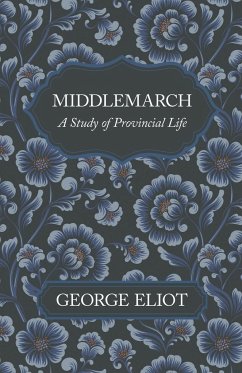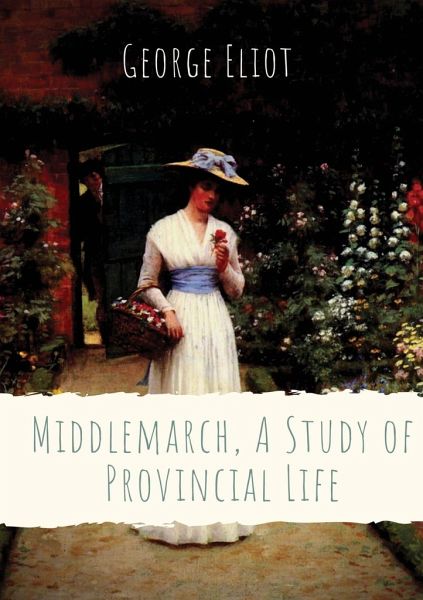
Middlemarch, A Study of Provincial Life
a novel by the English author George Eliot (Mary Anne Evans) setting in a fictitious Midlands town from 1829 to 1832, and following distinct, intersecting stories with many characters
Versandkostenfrei!
Versandfertig in 1-2 Wochen
25,99 €
inkl. MwSt.
Weitere Ausgaben:

PAYBACK Punkte
13 °P sammeln!
Middlemarch, A Study of Provincial Life (George Eliot) Middlemarch, A Study of Provincial Life is a novel by the English author George Eliot (Mary Anne Evans), appearing in eight instalments (volumes) in 1871 and 1872. Set in a fictitious Midlands town from 1829 to 1832, it follows distinct, intersecting stories with many characters. Issues include the status of women, the nature of marriage, idealism, self-interest, religion, hypocrisy, political reform, and education. Despite comic elements, Middlemarch uses realism to encompass historical events: the 1832 Reform Act, early railways, and the...
Middlemarch, A Study of Provincial Life (George Eliot) Middlemarch, A Study of Provincial Life is a novel by the English author George Eliot (Mary Anne Evans), appearing in eight instalments (volumes) in 1871 and 1872. Set in a fictitious Midlands town from 1829 to 1832, it follows distinct, intersecting stories with many characters. Issues include the status of women, the nature of marriage, idealism, self-interest, religion, hypocrisy, political reform, and education. Despite comic elements, Middlemarch uses realism to encompass historical events: the 1832 Reform Act, early railways, and the accession of King William IV. It views contemporary medicine and examines reactionary views in a settled community facing unwelcome change. Eliot began writing the two pieces that would form the novel in 1869-1870 and completed it in 1871. Initial reviews were mixed, but it is now seen widely as her best work and one of the great novels in English.Middlemarch originates in two unfinished pieces that Eliot worked on during 1869 and 1870: the novel "Middlemarch"(which focused on the character of Lydgate) and the long story "Miss Brooke" (which focused on the character of Dorothea). The former piece is first mentioned in her journal on 1 January 1869 as one of the tasks for the coming year. In August she began writing, but progress ceased in the following month amidst a lack of confidence about it and distraction caused by the illness of George Henry Lewes's son Thornie, who was dying of tuberculosis. (Eliot had been living with Lewes since 1854 as part of an open marriage.) Following Thornie's death on 19 October 1869, all work on the novel stopped it is uncertain at this point whether or not Eliot intended to revive it at a later date.In December she wrote of having begun another story, on a subject that she had considered "ever since I began to write fiction". By the end of the month she had written a hundred pages of this story and entitled it "Miss Brooke". Although a precise date is unknown, the process of incorporating material from "Middlemarch" into the story she had been working on was ongoing by March 1871.In the process of composition, Eliot compiled a notebook of hundreds of literary quotations including excerpts from poets, historians, playwrights, philosophers, and critics in eight different languages.By May 1871, the growing length of the novel had become a concern to Eliot, as it threatened to exceed the three-volume format that was the norm in publishing. The issue was compounded by the fact that Eliot's most recent novel, Felix Holt, the Radical (1866) - also set in the same pre-Reform Bill England-had not sold well. The publisher John Blackwood, who had made a loss on acquiring the English rights to that novel, was approached by Lewes in his role as Eliot's literary agent. He suggested that the novel be brought out in eight two-monthly parts, borrowing from the method of Victor Hugo's novel Les Misérables.



